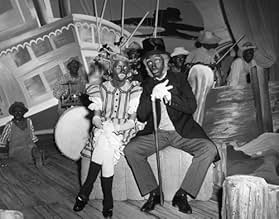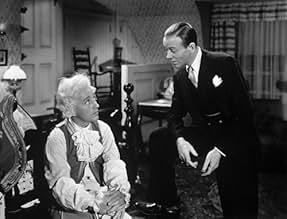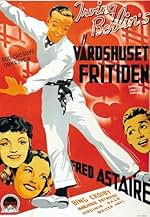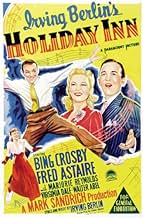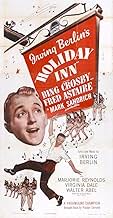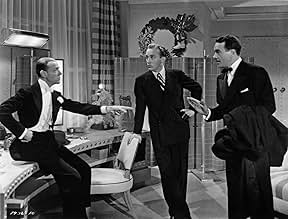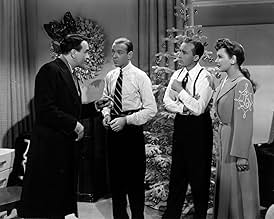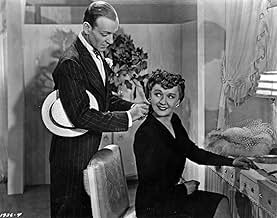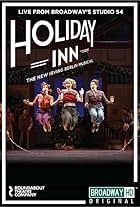NOTE IMDb
7,3/10
19 k
MA NOTE
Dans une auberge ouverte uniquement pendant les vacances, un crooner et un saboteur se disputent les charmes d'une belle artiste prometteuse.Dans une auberge ouverte uniquement pendant les vacances, un crooner et un saboteur se disputent les charmes d'une belle artiste prometteuse.Dans une auberge ouverte uniquement pendant les vacances, un crooner et un saboteur se disputent les charmes d'une belle artiste prometteuse.
- Réalisation
- Scénario
- Casting principal
- Récompensé par 1 Oscar
- 3 victoires et 2 nominations au total
Bob Crosby Orchestra
- Orchestra
- (as Bob Crosby's Band)
Edward Arnold Jr.
- Second Dancer Ted Bumps Into
- (non crédité)
Loretta Barnett
- Dancer
- (non crédité)
Muriel Barr
- Dancer
- (non crédité)
Harry Barris
- Midnight Club Orchestra Leader
- (non crédité)
Patsy Bedell
- Dancer
- (non crédité)
Avis à la une
This film is good in so many ways. The song and dance numbers were all great. Teaming Bing Crosby and Fred Astaire was a great idea. These two played off each other so well that I can't imagine two other actors doing so well. Even Crosby and Hope wouldn't have done as well here. Marjorie Reynolds was a treat to look at but also had good chemistry with both Crosby and Astaire. The support cast was equally as good, Walter Abel as Danny Reed, Virginia Dale as Lila Dixon and Louise Beavers as Mamie gave solid performances.
The set was also beautiful. Obviously the Hollywood set of Holiday Inn at the end of the film that was supposed to be a reproduction of the real Holiday Inn in Connecticut is the same set used for both scenes. However it is such a realistic set that the viewer never suspects that the Connecticut scenes were filmed indoors. I think the fact that the film was in black and white helps in that respect. A color film may have actually looked more phoney.
The story is a simple one but well put together. I think many viewers can relate to guys trying to steal girls from one another, its a common enough practice today. The ending is a bit fairy tale like but then that is why so many probably like it. We get enough "reality" in our every day lives. It is nice to escape reality with a film like this.
Lastly, the black face scene during the Lincoln Day performance is offensive but it does not ruin the film. Of course a minstrel show today using black face would be unacceptable in today's environment but you can't hold a 1940's film to the same standards. I know some would like to have that scene removed from the film but I disagree. I am of African American decent and while I could view this film as a disgrace I accept it for what it is. Rather than try and obliterate scenes such as this from our film history I think they should be viewed as stepping stones to where African Americans are in film today. There may still be barriers that need to be broken through in the film world but considering where African Americans started we as a society should also take time to appreciate the accomplishments that have been achieved. Black face is out. Demeaning "yesum" roles are for the most part gone and now leading roles that portray African Americans in well to do positions in society are becoming more and more frequent. So while some of the film history regarding African Americans portrays them in a negative manner it is because of those actors and actresses were able to work in those roles and under those conditions that the modern day African American actors and actresses are able be seen in a more positive light. Ignoring the past roles ignores the actors and actresses that struggled through those times.
The set was also beautiful. Obviously the Hollywood set of Holiday Inn at the end of the film that was supposed to be a reproduction of the real Holiday Inn in Connecticut is the same set used for both scenes. However it is such a realistic set that the viewer never suspects that the Connecticut scenes were filmed indoors. I think the fact that the film was in black and white helps in that respect. A color film may have actually looked more phoney.
The story is a simple one but well put together. I think many viewers can relate to guys trying to steal girls from one another, its a common enough practice today. The ending is a bit fairy tale like but then that is why so many probably like it. We get enough "reality" in our every day lives. It is nice to escape reality with a film like this.
Lastly, the black face scene during the Lincoln Day performance is offensive but it does not ruin the film. Of course a minstrel show today using black face would be unacceptable in today's environment but you can't hold a 1940's film to the same standards. I know some would like to have that scene removed from the film but I disagree. I am of African American decent and while I could view this film as a disgrace I accept it for what it is. Rather than try and obliterate scenes such as this from our film history I think they should be viewed as stepping stones to where African Americans are in film today. There may still be barriers that need to be broken through in the film world but considering where African Americans started we as a society should also take time to appreciate the accomplishments that have been achieved. Black face is out. Demeaning "yesum" roles are for the most part gone and now leading roles that portray African Americans in well to do positions in society are becoming more and more frequent. So while some of the film history regarding African Americans portrays them in a negative manner it is because of those actors and actresses were able to work in those roles and under those conditions that the modern day African American actors and actresses are able be seen in a more positive light. Ignoring the past roles ignores the actors and actresses that struggled through those times.
It is amazing how much the world has changed in the last 58 years. 58 years? Yes!
Reviewers who fault this movie for it's patriotism and display of martial force in the midst of a "holiday" movie are obviously too young to know what the world was like when this was made. It was a time of greater innocence, greater danger and greater racial discrimination. The innocence was that of the children and the general public who could take a "standard Hollywood plot" at face value. It was a time of danger, not necessarily from within society itself (as now when crime makes streets unsafe) but from the outside with dictators killing millions while they battle for world domination. Those tanks and planes WERE freedom. Without them we would be yelling "Seig Heil" today and would not have the right to critique a simple movie. The State would have made it for you and "you Will like it"!
As the "black face" routine was showing I turned to my family and said that I was sure that despite the "classic" status of this film there were probably a lot of people wincing as they watched Bing Crosby with burnt cork all over him.
I'm sure that before he died Bing too winced a little bit at that number, but taken in the context of history it was to be expected. Al Jolson made a career of blackface and never regretted it for a minute. Most of the American population accepted that that's "the way it is". Only in the last 40 years have we learned that's NOT the way it is.
Things change and it's understandable that after almost 60 years certain depictions of society as it existed then would be out of place today. 20 years ago the movie was popular but the music was certainly out of style. With the resurgence of the "big band sound" in the last 5-10 years people are noticing that Bob Crosby and the Bobcats were participants. No doubt a certain amount of nepotism existed, but Bob Crosby was not Billy Carter to Bing's Jimmy Carter. (Anyone under 20 can now run and look up Jimmy and Billy Carter.) Bob Crosby achieved a certain amount of star status with some of his recordings. He had 4 chart topping hits and led bands for almost 50 years. He was always eclipsed by his older brother, but then Bing Crosby was THE biggest star of that time, at least among singers.
Bob's music was a Dixieland style and it lent a lightness to the big band orchestrations of Irving Berlin's songs that might have otherwise made the music ponderous, too much so for this light comedy at least.
Remember, finally that when Holiday Inn came out we were losing WW2. The Pacific was a Japanese ocean, the Atlantic was virtually controlled by German U-Boats and Allied ships were being sunk within sight of American cities. The Axis also controlled all of Europe and the Russians were being rolled back into their own homeland.
Holiday Inn was escapist entertainment from this bleak reality and it is understandable if some martial patriotism was included to hearten the home front.
For 90% of the U.S., snow at Christmas is the exception rather than the rule, but the emotions expressed by the song White Christmas hit exactly the feelings of millions of soldiers taken from their homes to fight a war. If Holiday Inn did nothing else, it gave Americans something to believe in and remember when things were at their darkest.
"May your days be merry and bright, and may all your Christmases be White."
Reviewers who fault this movie for it's patriotism and display of martial force in the midst of a "holiday" movie are obviously too young to know what the world was like when this was made. It was a time of greater innocence, greater danger and greater racial discrimination. The innocence was that of the children and the general public who could take a "standard Hollywood plot" at face value. It was a time of danger, not necessarily from within society itself (as now when crime makes streets unsafe) but from the outside with dictators killing millions while they battle for world domination. Those tanks and planes WERE freedom. Without them we would be yelling "Seig Heil" today and would not have the right to critique a simple movie. The State would have made it for you and "you Will like it"!
As the "black face" routine was showing I turned to my family and said that I was sure that despite the "classic" status of this film there were probably a lot of people wincing as they watched Bing Crosby with burnt cork all over him.
I'm sure that before he died Bing too winced a little bit at that number, but taken in the context of history it was to be expected. Al Jolson made a career of blackface and never regretted it for a minute. Most of the American population accepted that that's "the way it is". Only in the last 40 years have we learned that's NOT the way it is.
Things change and it's understandable that after almost 60 years certain depictions of society as it existed then would be out of place today. 20 years ago the movie was popular but the music was certainly out of style. With the resurgence of the "big band sound" in the last 5-10 years people are noticing that Bob Crosby and the Bobcats were participants. No doubt a certain amount of nepotism existed, but Bob Crosby was not Billy Carter to Bing's Jimmy Carter. (Anyone under 20 can now run and look up Jimmy and Billy Carter.) Bob Crosby achieved a certain amount of star status with some of his recordings. He had 4 chart topping hits and led bands for almost 50 years. He was always eclipsed by his older brother, but then Bing Crosby was THE biggest star of that time, at least among singers.
Bob's music was a Dixieland style and it lent a lightness to the big band orchestrations of Irving Berlin's songs that might have otherwise made the music ponderous, too much so for this light comedy at least.
Remember, finally that when Holiday Inn came out we were losing WW2. The Pacific was a Japanese ocean, the Atlantic was virtually controlled by German U-Boats and Allied ships were being sunk within sight of American cities. The Axis also controlled all of Europe and the Russians were being rolled back into their own homeland.
Holiday Inn was escapist entertainment from this bleak reality and it is understandable if some martial patriotism was included to hearten the home front.
For 90% of the U.S., snow at Christmas is the exception rather than the rule, but the emotions expressed by the song White Christmas hit exactly the feelings of millions of soldiers taken from their homes to fight a war. If Holiday Inn did nothing else, it gave Americans something to believe in and remember when things were at their darkest.
"May your days be merry and bright, and may all your Christmases be White."
This is truly one of the great musicals to ever grace the silver screen. Between the great song, the dance numbers and the chemistry between Bing Crosby and Fred Astaire, this film really is one of the the all time classics. What really makes it great is that it pretty much plays like a great Broadway review that uses the different holidays as an excuse to display the individual talents of each of the film's stars. However, the thing that this film will truly be remembered for is the fact that it introduced one of the all time classic song's to the world, "White Christmas".
Another thing that makes this film so beloved is that it came out during a time when America needed somewhat of a diversion, World War II. This film helped to give people something to put smiles on their faces as the whole world was going to hell. At least for two hours, this film helped America to forget its troubles and put a smile on everyone's faces.
Another thing that makes this film so beloved is that it came out during a time when America needed somewhat of a diversion, World War II. This film helped to give people something to put smiles on their faces as the whole world was going to hell. At least for two hours, this film helped America to forget its troubles and put a smile on everyone's faces.
In Holiday Inn it isn't Bing Crosby or Fred Astair that makes the movie outstanding, but rather the relatively unknown "B" movie star of the time, Marjorie Reynolds. As you watch this movie you can "feel" the mood that Marjorie is portraying at the time, just by the look on her face. For example, during the the "Easter" scene, her eyes and smiles say it all, you can see she is in love, and as she sings "White Christmas" at the end you can feel the sadness of her character - throughout the entire movie she says more with her facial expressions then the most popular movie stars do today in their entire careers... If you love truly good acting, Holiday Inn will make you smile and make you cry, it will bring back memories of a time when ladies could truly dance in high heel shoes, we don't see that type of dancing these days in movies. Picture quality, sound and special effects are not of primary importance in these kinds of films, these are the kind that rely on your own imagination and feelings, much in the way you do when you read a good book.
These older movies serve up so much good feelings they could be used to replace prescription meds for those feeling bad.
These older movies serve up so much good feelings they could be used to replace prescription meds for those feeling bad.
"Holiday Inn" is the story of singer/dancer entertainers (Fred Astaire, Bing Crosby, Virginia Dale) who work together in New York. As the group splits up, one seeking a more tranquil life style, a third entertainer comes on the scene as a young aspiring singer/dancer (Marjorie Reynolds). Hoping to break into the business, she meets and begins work with one of the successful members. Relationships develop and change. This film (if it is not) should be an American classic. The music is excellent with performances of "White Christmas" and "Easter Parade." Both singing and dancing is very good (and what else could you expect with Astaire and Reynolds) and singing with Crosby. It is a warm, romantic film which depicts the celebration of many holidays. We use "Holiday Inn" as a staple, showing it several times during the Christmas season. Unlike many films from this era, it can be found is BOTH VHS and DVD. The DVD version includes both "Holiday Inn" and "Going My Way," another Crosby film. This is a great "feel good" film with a fantastic cast.
Histoire
Le saviez-vous
- AnecdotesThe Connecticut inn set for this film was reused by Paramount 12 years later as a Vermont inn for the musical Noël blanc (1954), also starring Bing Crosby, and again with songs composed by Irving Berlin.
- GaffesThe telegram that Ted Hanover receives from Jim Hardy on Christmas Eve is dated December 25th.
- Citations
Linda Mason: My father was a lot like you, just a man with a family. Never amounted to much, didn't care. But as long as he was alive, we always had plenty to eat and clothes to keep us warm.
Jim Hardy: Were you happy?
Linda Mason: Yes.
Jim Hardy: Then your father was a very successful man.
- Crédits fousIn the opening titles the main credits for Irving Berlin as composer and lyricist, and Mark Sandrich as producer and director, are each facsimiles of their genuine signatures.
- Versions alternativesIn 2008, the film was restored and colorized by Legend Films.
- ConnexionsFeatured in Concept (1964)
- Bandes originalesOverture
(uncredited)
Music and Lyrics by Irving Berlin
Performed by the Paramount Pictures Studio Orchestra and Chorus conducted by Robert Emmett Dolan
Meilleurs choix
Connectez-vous pour évaluer et suivre la liste de favoris afin de recevoir des recommandations personnalisées
Détails
Box-office
- Budget
- 3 200 000 $US (estimé)
- Montant brut mondial
- 80 $US
- Durée1 heure 40 minutes
- Couleur
- Rapport de forme
- 1.37 : 1
Contribuer à cette page
Suggérer une modification ou ajouter du contenu manquant

Lacune principale
By what name was L'amour chante et danse (1942) officially released in India in English?
Répondre

